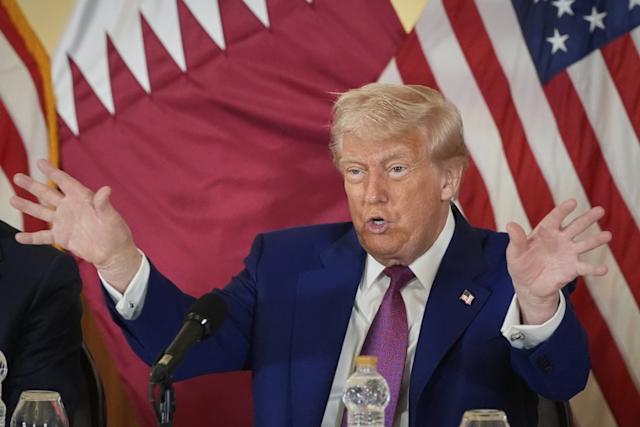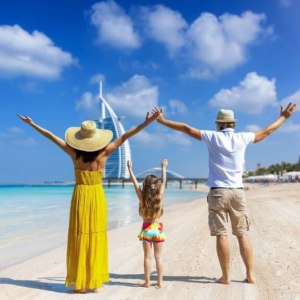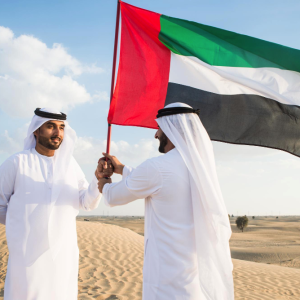In a momentous evening of elegance and diplomacy, former U.S. President Donald J. Trump attended a state dinner hosted in his honor at the opulent Presidential Palace in Abu Dhabi. The event marked a symbolic gesture of goodwill, mutual respect, and strategic collaboration between the United Arab Emirates and the United States. Lavishly arranged and attended by prominent Emirati dignitaries, business leaders, and diplomats, the dinner celebrated more than just hospitality—it served as a reaffirmation of strong bilateral ties and deepening cultural appreciation.
A Magnificent Setting for Diplomatic Dialogue
Set against the architectural grandeur of Abu Dhabi’s Qasr Al Watan—the Palace of the Nation—the state dinner unfolded in a majestic ambiance. The palace, renowned for its dazzling white façade, intricate mosaics, and immense chandeliers, provided a breathtaking backdrop for the evening.
As Trump arrived at the palace gates, he was welcomed with full ceremonial honors. A red carpet lined with guards in traditional Emirati attire led him into the palace halls, where he was received by high-ranking members of the UAE government. The atmosphere exuded grace, protocol, and a deep respect for cultural traditions.

A military band played the national anthems of both nations, symbolizing a unified front in fostering diplomacy and economic partnerships. Trump, dressed in formal attire, expressed gratitude for the warm welcome and praised the UAE for its hospitality and leadership.
Conversations Beyond the Table
While the evening centered around a formal dinner, it was also rich in strategic discussions. According to insiders, topics ranged from economic cooperation and trade investments to regional security and technological collaboration. Trump acknowledged the UAE’s pivotal role in maintaining regional stability and highlighted the enduring partnership between the two countries.

In his toast, Trump remarked, “The relationship between the United States and the United Arab Emirates has never been stronger. Tonight is not just a celebration of friendship, but a recognition of shared values and our vision for a prosperous future together.”
He added, “The UAE has always been a beacon of innovation, peace, and cultural heritage. It’s a true honor to be welcomed so warmly in this great nation.”
Emirati officials reciprocated with equally warm sentiments. A senior government official at the event described the dinner as “a testament to the UAE’s enduring commitment to open dialogue, mutual cooperation, and international diplomacy.”
Culinary Excellence Meets Cultural Symbolism
The menu for the state dinner was a curated masterpiece reflecting the rich culinary traditions of the Gulf with an international flair. Guests enjoyed a series of gourmet courses that combined Emirati ingredients—such as saffron, dates, lamb, and seafood—with global techniques.
Dishes were served on fine china beneath the glittering chandeliers of the palace banquet hall, creating a setting that was as symbolic as it was sumptuous. From traditional gahwa (Arabic coffee) and dates during the welcome reception to the elegant saffron-infused rice and grilled kingfish served during the main course, the dinner embodied a spirit of cultural fusion.
Entertainment included performances by local musicians, blending classical Arabic melodies with contemporary instrumentation, creating an ambiance of unity between heritage and modernity.
A Strategic and Symbolic Visit
Trump’s attendance at the state dinner was part of a larger visit to the UAE, during which he met with political and business leaders, toured cultural landmarks such as the Sheikh Zayed Grand Mosque, and explored potential avenues for collaboration in real estate, energy, and infrastructure.
Though no longer in office, Trump remains a prominent political and business figure whose presence carries diplomatic weight. His visit to the UAE was widely interpreted as an effort to solidify relationships in a region of strategic importance to American interests.
Observers noted that the dinner was symbolic of not only Trump’s enduring connections to the Gulf but also the UAE’s position as a key global partner. The UAE has, in recent years, expanded its influence through major investments in technology, renewable energy, space exploration, and infrastructure—areas where American cooperation remains critical.

Praise for Emirati Leadership
During his speech, Trump made special mention of the UAE’s visionary leadership under President His Highness Sheikh Mohamed bin Zayed Al Nahyan. He commended the Emirati government for fostering a peaceful, prosperous society and promoting religious tolerance and innovation.
“Under His Highness’s leadership,” Trump stated, “the UAE has become a shining example of what is possible when ambition is matched with integrity and vision. I’ve witnessed firsthand the incredible progress this country has made, and I applaud it.”
Emirati attendees appreciated Trump’s words and expressed optimism for continued collaboration. A member of the presidential advisory council remarked, “The presence of such influential international figures reflects our country’s growing role as a center for diplomacy, innovation, and global leadership.”
Media and Public Reaction
Coverage of the event was swift and widespread, with regional media highlighting the grandeur of the palace, the symbolism of Trump’s visit, and the deeper significance of renewed U.S.–UAE engagement.
Images of Trump alongside Emirati leaders beneath the domed ceilings of Qasr Al Watan quickly circulated on social media, sparking discussions around diplomacy, legacy, and cultural exchange.
Public reaction was generally positive, especially among Emiratis who viewed the dinner as a sign of respect toward their nation’s traditions and international stature. For many, the event signaled a forward-looking chapter in U.S.–UAE relations—one that transcends political office and is rooted in shared economic interests and strategic collaboration.
Looking Forward
Though Trump’s visit was largely ceremonial, it carried undertones of business interest and international engagement. Analysts suggest that such high-profile visits lay the groundwork for future investment and partnership opportunities, particularly in sectors like artificial intelligence, green energy, and real estate.
The UAE, increasingly seen as a hub for global influence and innovation, continues to attract world leaders and influencers who wish to align with its vision. As the nation prepares for future global expos, cultural events, and international forums, visits like these elevate its status and attract global attention.
Conclusion: A Night of Diplomacy and Dignity
The state dinner hosted in honor of Donald Trump at Abu Dhabi’s Presidential Palace was more than a ceremonial event—it was a moment that reflected deep respect, a celebration of partnership, and a powerful message of unity in diversity.
As golden chandeliers illuminated the faces of diplomats and dignitaries, and toasts echoed beneath the intricately carved ceilings, one thing was clear: Abu Dhabi had once again positioned itself at the center of meaningful global dialogue. And for Trump, it was a reminder that diplomacy, when built on mutual respect, continues long after one leaves office.
Do follow Uae stories for more Updates
Also read : Heritage Reimagined: Abu Dhabi’s Cultural Foundation Reopens After Renovations












